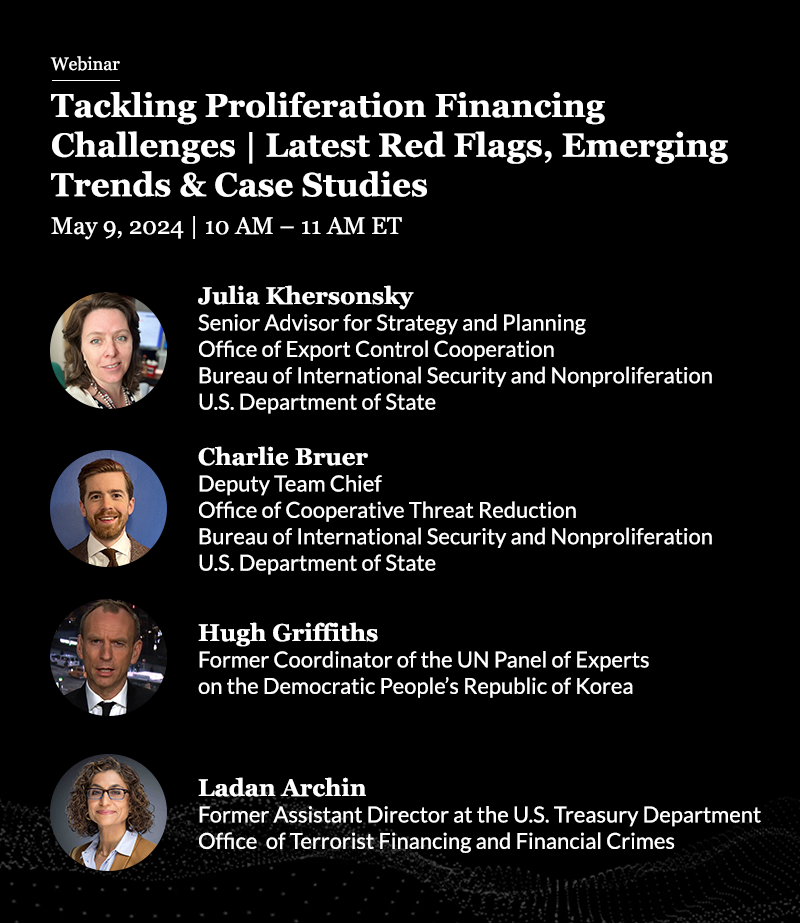2024 National Proliferation Financing Risk Assessment
A discussion of the threats, vulnerabilities, and regulatory factors of proliferation financing
📅 April 19, 2024
📅 April 19, 2024
The U.S. Department of the Treasury published the 2024 National Proliferation Financing Risk Assessment in February 2024 providing an in-depth analysis of the threats and vulnerabilities related to proliferation financing (PF) and highlighting key countries and non-state actors working to gain access to weapons of mass destruction (WMDs) and their components and to conventional restricted weapons and technologies. The report assesses that the U.S. financial system’s size, the dominance of the U.S. dollar, and the role of U.S. manufacturers in producing military-related technology make it a target for exploitation by proliferation financing networks. While there is a strong culture of compliance with U.S. law among financial institutions and other private-sector actors, gaps remain, necessitating ongoing efforts to improve counterproliferation financing programs.
PF networks, often operating at the direction of state actors like Russia, the Democratic People’s Republic of Korea (DPRK), and Iran continue to exploit the U.S. financial system and private sector to finance WMD proliferation. The Treasury assessment highlights both Russia and the DPRK as an increased risk owing to the scope and sophistication of their illicit procurement and revenue-generation efforts for WMD capabilities.
Based on a review of the relevant data since 2022, Russia and the DPRK are the highest-risk threat actors, according to the Treasury. Iran, China, Syria, Pakistan, and non-state actors also pose significant risks in terms of proliferation financing, either through direct involvement in WMD programs or by supporting illicit procurement activities. The report emphasizes the persistent dangers posed by state actors and their networks in financing WMD proliferation, highlighting the ongoing need for vigilance, compliance efforts, and international collaboration to effectively tackle these threats.
The economic factors related to the U.S. financial system’s structure and accessibility make it a prime target for proliferators seeking to fund their WMD programs through illicit means, according to the Treasury assessment. The size, sophistication, stability, and openness of the U.S. financial system make it vulnerable to misuse by illicit proliferation networks.
Legal and regulatory factors play a crucial role in shaping the risk landscape of proliferation financing by setting standards, requirements, and mechanisms for monitoring and preventing illicit financial activities related to WMD proliferation.
The United States has a robust legislative and regulatory framework to combat proliferation financing, given the ongoing threats posed by WMD proliferators and their networks. These threats include the acquisition of dual-use technology, revenue-raising efforts targeting U.S. entities, and new trends such as the use of cryptocurrencies as alternatives to the U.S. dollar in global trade. The United States will continue targeting PF procurement networks, while also addressing challenges such as sanctions evasion, state complicity, new payment infrastructure, and emerging technologies that could be misused for proliferation activities.
Structural vulnerabilities in the U.S. financial system and the centrality of the U.S. dollar in global trade continue to make the country a target for PF exploitation, although compliance efforts by financial institutions have been mitigating these risks. Strengthening the U.S. counter-proliferation finance regime is key to preventing WMD-related threats.
Over the past six months, the Russian Federation has vetoed a renewal of UN sanctions against Iran’s ballistic missile and UAV program, as well as a resolution extending the mandate of the UN Panel of Experts monitoring the sanctions on North Korea, while at the same time importing Iranian and North Korean UAVs and ballistic missiles for use in its war against Ukraine.
Russia’s vetoes have effectively dismantled the multilateral sanctions framework on Iran and abolished multilateral sanctions monitoring capabilities for North Korea. Russia’s procurement of North Korean ballistic missiles and Iranian UAVs in Ukraine further heighten proliferation finance and sanctions risk for the private sector.











 Counterproliferation Finance Detection and Deterrence – What Can Financial...
Counterproliferation Finance Detection and Deterrence – What Can Financial...This site uses cookies. By continuing to browse the site, you are agreeing to our use of cookies.
Accept settingsHide notification onlySettingsWe may request cookies to be set on your device. We use cookies to let us know when you visit our websites, how you interact with us, to enrich your user experience, and to customize your relationship with our website.
Click on the different category headings to find out more. You can also change some of your preferences. Note that blocking some types of cookies may impact your experience on our websites and the services we are able to offer.
These cookies are strictly necessary to provide you with services available through our website and to use some of its features.
Because these cookies are strictly necessary to deliver the website, refusing them will have impact how our site functions. You always can block or delete cookies by changing your browser settings and force blocking all cookies on this website. But this will always prompt you to accept/refuse cookies when revisiting our site.
We fully respect if you want to refuse cookies but to avoid asking you again and again kindly allow us to store a cookie for that. You are free to opt out any time or opt in for other cookies to get a better experience. If you refuse cookies we will remove all set cookies in our domain.
We provide you with a list of stored cookies on your computer in our domain so you can check what we stored. Due to security reasons we are not able to show or modify cookies from other domains. You can check these in your browser security settings.
These cookies collect information that is used either in aggregate form to help us understand how our website is being used or how effective our marketing campaigns are, or to help us customize our website and application for you in order to enhance your experience.
If you do not want that we track your visit to our site you can disable tracking in your browser here:
We also use different external services like Google Webfonts, Google Maps, and external Video providers. Since these providers may collect personal data like your IP address we allow you to block them here. Please be aware that this might heavily reduce the functionality and appearance of our site. Changes will take effect once you reload the page.
Google Webfont Settings:
Google Map Settings:
Google reCaptcha Settings:
Vimeo and Youtube video embeds:
You can read about our cookies and privacy settings in detail on our Privacy Policy Page.
Privacy Policy